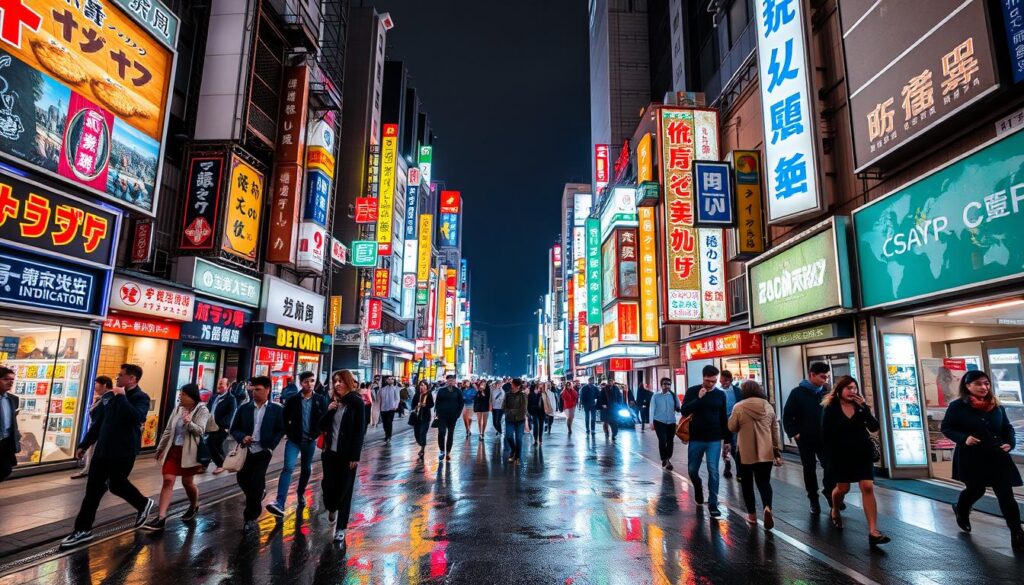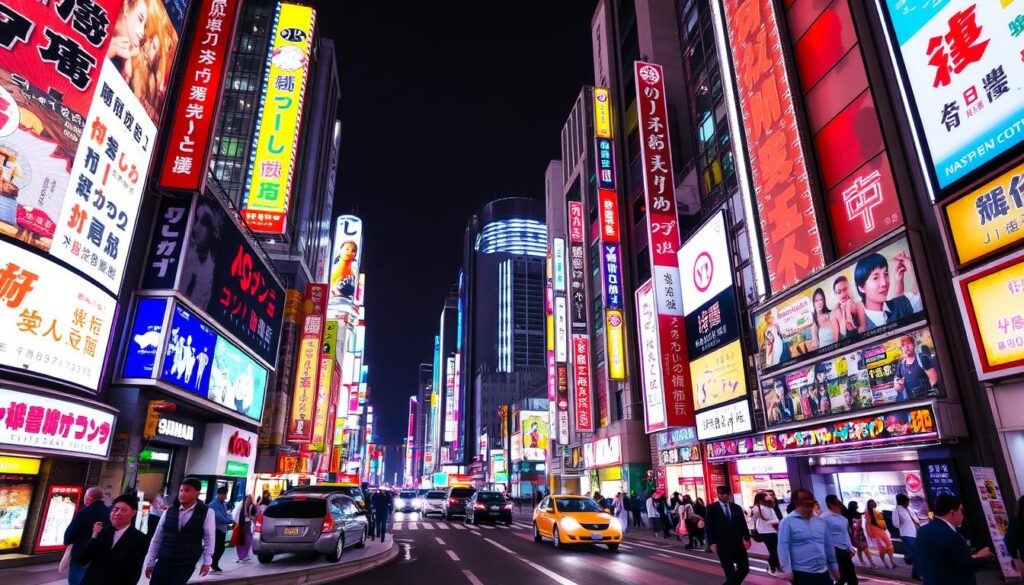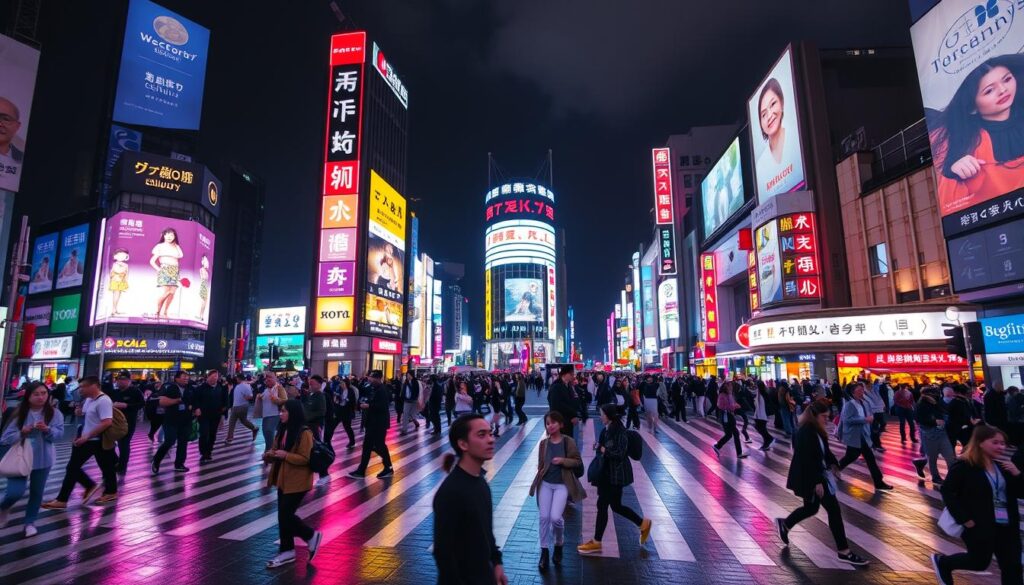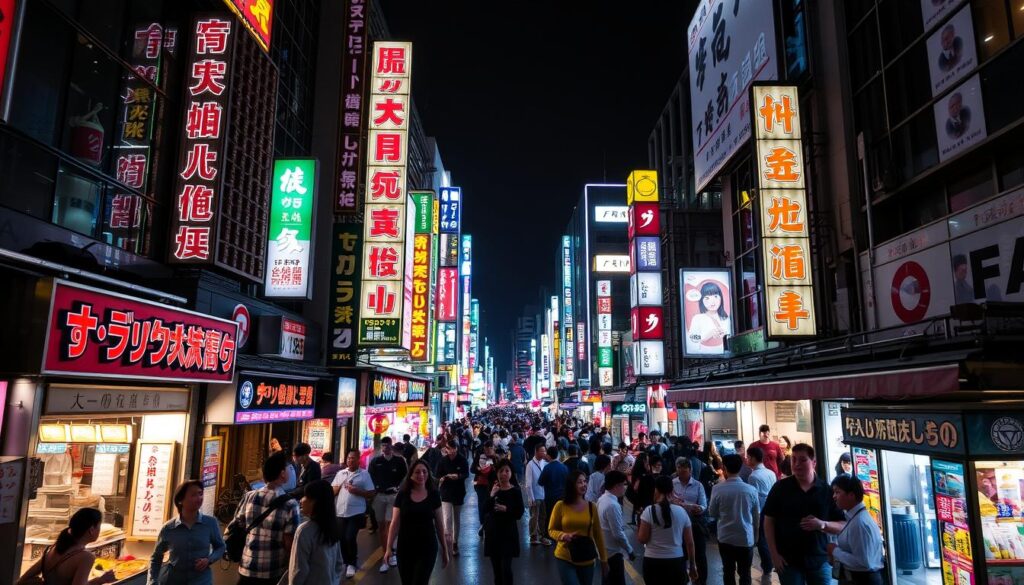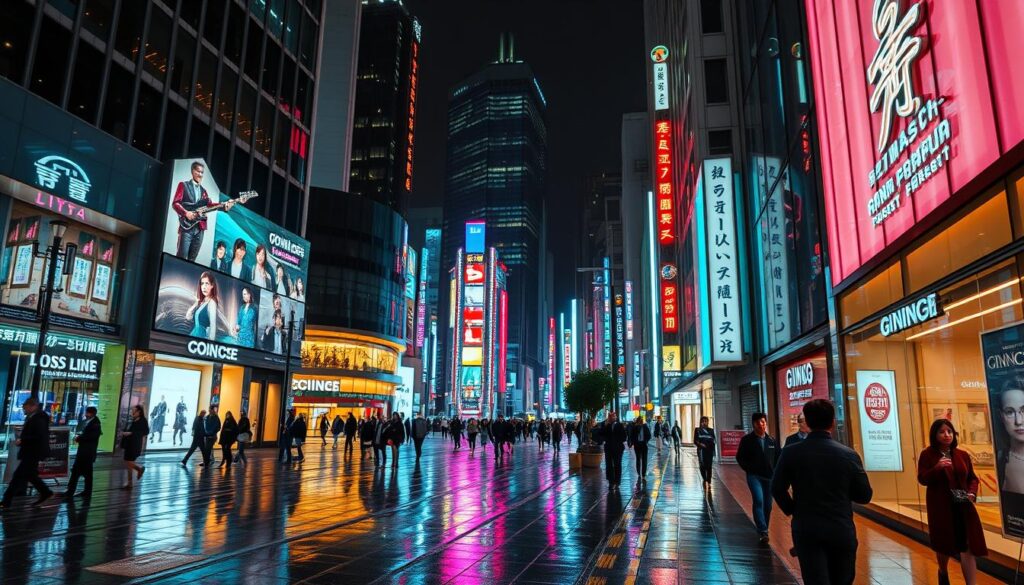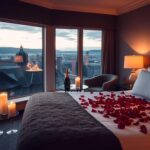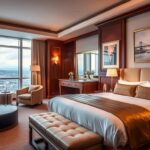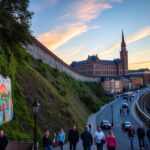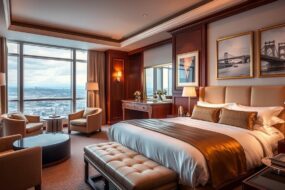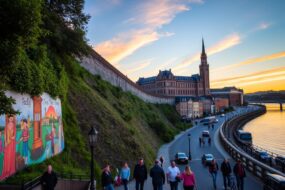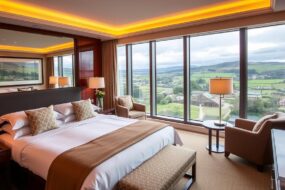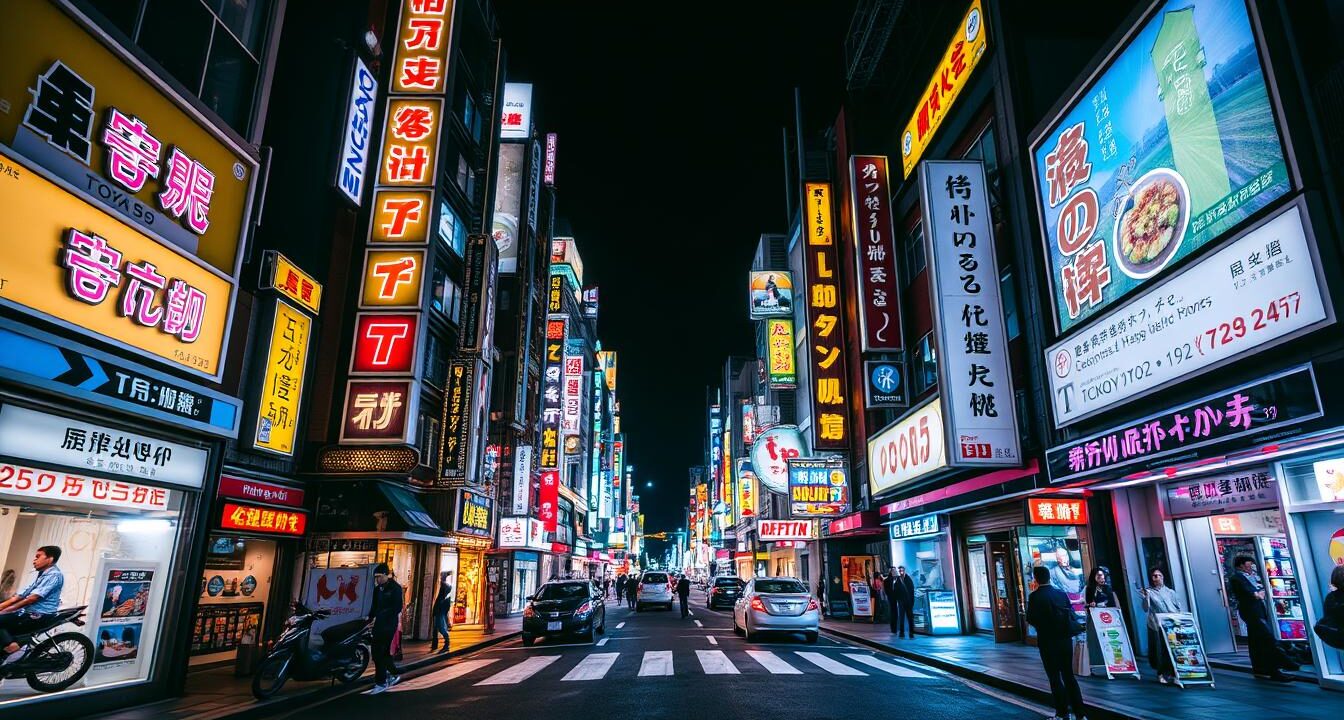
As the sun sets over Tokyo, a dazzling spectacle unfolds before your eyes. Towering skyscrapers come alive with a symphony of neon lights. This creates a mesmerizing glow that seems to radiate from the city’s heart. This is the Tokyo I fell in love with – a city that pulses with energy unlike any other.
Navigating Tokyo’s neon-lit streets is an adventure. It reveals the city’s multifaceted personality. From Shinjuku’s bustling entertainment district to Ginza’s sophisticated allure, each neighborhood offers a unique glimpse into Tokyo’s vibrant nightlife and cultural richness. Whether you’re a first-time visitor or a seasoned Tokyo enthusiast, this guide will lead you on an illuminating journey through the city’s most iconic neon-drenched districts.
Key Takeaways
- Discover the most renowned neon-lit districts in Tokyo, each with its own distinct character and attractions.
- Explore the rich history and cultural significance behind Tokyo’s world-famous neon lights and their evolution over time.
- Uncover the best vantage points and photography tips to capture the city’s neon-infused landscapes in all their dazzling glory.
- Navigate the bustling streets and hidden alleys of Tokyo’s neon districts with confidence, unlocking the secrets of the city’s nocturnal wonderland.
- Immerse yourself in the vibrant food, entertainment, and nightlife that make Tokyo’s neon-lit neighborhoods truly unforgettable.
Understanding Tokyo’s Illuminated Landscape
Tokyo’s urban landscape is a captivating tapestry of neon-soaked streets and vibrant cityscapes. It attracts visitors from around the world. This dazzling illumination has deep roots in the city’s history.
It evolved from the iconic neon culture of the past to the energy-efficient LED technology of the present.
The History of Neon Culture in Tokyo
The story of Tokyo’s neon culture began in the 1920s. The city’s first neon signs were introduced then. These luminous advertisements quickly became a hallmark of the city’s bustling districts, like the infamous Kabukicho entertainment hub.
Over the decades, the neon landscape expanded. It transformed Tokyo into a mesmerizing wonderland of glowing lights and dynamic displays.
Why Tokyo’s Lights Are World-Famous
Tokyo’s neon-lit streets have gained global fame for their sheer intensity and aesthetic appeal. The city’s unique blend of traditional architecture and modern design creates a captivating contrast. Neon signs and LED displays complement historic landmarks like the Senso-ji Temple and Meiji Shrine.
From the dizzying Shibuya Crossing to the futuristic Tokyo Skytree, Tokyo’s illuminated cityscapes have become an iconic part of the city’s identity.
Modern LED Revolution
In recent years, Tokyo has embraced a modern LED revolution. Many neon signs have been replaced by energy-efficient LED technology. While the city’s iconic glow remains, this shift towards sustainability has allowed Tokyo to maintain its vibrant nightscape while reducing its environmental impact.
Despite these changes, the allure of Tokyo’s neon-infused landscapes continues to captivate visitors and photographers from around the world.
“Tokyo’s neon-soaked streets have become a global symbol of the city’s captivating blend of tradition and modernity.”
Top Neon Districts in Tokyo
Tokyo’s nightlife is famous for its vibrant cityscapes and urban exploration spots. The city has many neon-lit areas, each with its own vibe and attractions. From Shinjuku‘s lively entertainment scene to Odaiba‘s futuristic waterfront, these places offer a mix of sights and sounds.
Shinjuku is a top spot, known for Kabukicho’s neon lights and nightclubs. Don’t miss Golden Gai, a maze of alleys with tiny bars and eateries.
Shibuya is known for its Tokyo nightlife. It has many bars, clubs, and izakayas. Shibuya Crossing is the busiest spot in Japan, with thousands crossing at once.
Ikebukuro is home to the Sunshine City complex, with its bright skyscrapers and entertainment spots. It’s a great place for urban exploration, with a local food scene and hidden spots.
Ginza is all about luxury, with its high-end shopping and dining. Nearby Yurakucho has its own charm, with izakayas, bars, and eateries under the railway tracks.
Odaiba offers stunning views of Rainbow Bridge and Tokyo Skytree. It’s a perfect spot for urban exploration and vibrant cityscapes.
Looking for neon lights, fine dining, or just to explore Tokyo’s vibrant cityscapes? These top neon districts give you a glimpse into Tokyo’s lively urban exploration scene.
Shinjuku: The Heart of Tokyo’s Neon Universe
Shinjuku is the heart of Tokyo’s neon world, a lively area filled with urban exploration spirit. It’s home to the busiest railway station, showing off Japan’s famous city lights and Tokyo nightlife.
Kabukicho Entertainment District
Kabukicho is at Shinjuku’s core, known for its bright lights and fun spots. It has hotels, karaoke bars, and clubs. The area’s narrow alleys and bright signs give a peek into Tokyo’s night life.
Golden Gai’s Glowing Alleys
Golden Gai is hidden in Shinjuku’s streets, with small bars and places to eat. It’s a place for those who want to see old Tokyo nightlife.
Best Observation Points
- Tokyo Metropolitan Government Building Observatory: This spot offers amazing, free views of the city. It’s a top choice for seeing Shinjuku’s bright lights.
- Godzilla Head: This famous Godzilla statue is a symbol of Shinjuku’s fun and lively vibe.
Shinjuku mixes tall buildings, peaceful shrines, and a lively urban exploration scene. It’s lit up by city lights and Tokyo nightlife. Whether you want to see the city from above or dive into the local scene, Shinjuku gives you a unique taste of Tokyo’s energy.
Shibuya: Where Lights Meet Life
Shibuya is the heart of Tokyo, famous for its busy pedestrian crossing at night. The neon lights create a stunning scene, especially in the youth-focused area. It’s close to Harajuku and has everything from shops to traditional izakayas.
The Shibuya Crossing is a top spot for Tokyo sightseeing. It lights up with vibrant cityscapes and urban exploration at night. It’s busiest on weekdays and weekends, and you can get there from Shibuya Station.
Photographers love Shibuya Crossing for its lively vibe. But, be careful of the crowds, especially during busy times. The Shibuya Station Hachiko Exit Walkway gives a great view for photos.
Shibuya has lots to do, from cool shops to Japanese food and nightlife. It’s a place where you can dive into Tokyo’s modern urban exploration.
“Shibuya Crossing represents Tokyo with its bustling atmosphere, filled with people, action, and entertainment.”
Shibuya is a must-see for anyone visiting Tokyo. It shows the city’s energy with its neon lights and lively culture. It’s a place full of discovery and excitement.
Exploring Ikebukuro After Dark
Tokyo’s Ikebukuro district is a vibrant hub that truly comes alive at night. Beyond the bustling Tokyo city lights, this area offers a diverse array of entertainment, dining, and shopping options. These options cater to every type of Tokyo nightlife enthusiast.
Sunshine City Illuminations
The Sunshine City complex in Ikebukuro is a prominent landmark. It houses an aquarium, planetarium, and the world-famous Gashapon Department Main Store. The store features over 3,000 gachapon (capsule toy) machines. As night falls, the Sunshine City illuminations cast a mesmerizing glow across the area. This creates a captivating atmosphere for visitors to explore.
Entertainment Hotspots
Ikebukuro is known for its impressive selection of gaming arcades. These include the massive Taito Station Ikebukuro, Mikado Game Center, and SEGA Ikebukuro GIGO. For those seeking a lively nightlife experience, the neighborhood boasts a vibrant bar scene. This scene includes popular izakaya (Japanese-style pubs) and karaoke venues dotting the city lights-drenched streets.
Local Food Scene
Foodies will find plenty to savor in Ikebukuro’s diverse Japan travel guide dining options. From the renowned Aka Oni okonomiyaki restaurant to the countless Don Quijote discount department stores, the area caters to a variety of tastes and budgets.
“Ikebukuro is a treasure trove of neon-drenched entertainment, where the energy of Tokyo’s city lights and Tokyo nightlife converge in a truly unforgettable way.”
Ginza and Yurakucho: Sophisticated Neon
Tokyo’s sightseeing and urban exploration hit new heights in Ginza and Yurakucho. These areas offer a refined neon glow. They mix high-end shopping, gourmet food, and a mature vibe.
Chuo Dori in Ginza is the heart of this neon scene. On weekends, it turns into a pedestrian paradise. The street is lined with neon ads and signs, showing Tokyo’s historic neon culture and modern luxury.
Walking through Ginza, you’ll see many high-end brands and dining spots. The neon light adds to the allure. You can enjoy Japanese, Western, and Chinese food in various settings, from casual bars to fancy restaurants.
Yurakucho is just a 5-minute walk from Ginza. It offers more of the same sophisticated neon. It’s easy to get to from Shimbashi and Yurakucho stations. Here, you’ll find dining options from casual to fancy, all lit up by neon.
These areas are surrounded by attractions like Hibiya Park and the Tokyo Takarazuka Theater. You’ll also find luxury brand shops along Chuo-dori in Ginza. Ginza and Yurakucho offer a refined look at Tokyo’s famous neon lights.
Tokyo’s Neon Streets: A City Guide for Night Photography
Tokyo’s neon streets are a dream for photographers, full of vibrant cityscapes that never sleep. This guide is for both new and seasoned night photographers. It offers tips to enhance your urban exploration in Tokyo.
Camera Settings for Neon Photography
To capture the neon lights, try shutter speeds from 1/15 to 2 seconds. Use a low ISO, like 100-400, to avoid noise and keep images sharp. A tripod is essential for clear, blur-free shots.
Best Times to Shoot
The best time for Tokyo’s neon shots is in the evening. The area around Shinjuku shines from 6 PM to 10 PM. Shibuya Crossing and Ginza also offer great night photography spots.
Popular Photography Locations
Some top spots for Tokyo’s vibrant cityscapes at night include:
- Shinjuku’s skyscraper district, with its towering buildings and neon-lit signage
- Shibuya Crossing, a bustling intersection known for its urban exploration and mesmerizing light displays
- Ginza’s illuminated streets, showcasing high-end brands and a sophisticated atmosphere
- Odaiba’s waterfront, featuring the iconic Rainbow Bridge and a Ferris wheel that comes to life at night
Exploring these spots and trying different angles will help you capture Tokyo’s unique night atmosphere.
For amazing night photography in Tokyo, embrace the city’s energy. Experiment with your camera and stay open to the endless creative possibilities on the neon streets.
Odaiba: Futuristic Waterfront Lights
Odaiba is a special area in Tokyo, known for its Tokyo sightseeing, city lights, and urban exploration. At its center is the famous Rainbow Bridge. It shines brightly, showing off its colors on the water below. During special times, it lights up with a stunning rainbow effect, making it magical for visitors.
Odaiba has more to offer than just the bridge. It’s home to the huge, illuminated Gundam statue, showing Japan’s love for new tech and pop culture. You can also see the city from high up on the Ferris wheel at Venus Fort. The shopping malls have bright walkways, perfect for exploring.
Visiting Odaiba is like stepping into a futuristic waterfront experience. The lights and reflections create a beautiful scene. Whether you’re taking photos or just enjoying the vibe, Odaiba is a must-see in Tokyo sightseeing.
| Attraction | Description | Pricing |
|---|---|---|
| teamLab Planets TOKYO | Immersive digital art exhibition | ¥3,402 (Updated 2024/11/15) |
| Tokyo Joypolis | Indoor theme park with over 20 attractions | ¥4,700 (Updated 2024/11/15) |
| LEGOLAND Discovery Center Tokyo | Themed zones for creative building activities | 10% discount on online bookings |
| Madame Tussauds Tokyo | Wax museum with international and Japanese celebrities | Combo tickets with LEGOLAND available |
| Takoyaki Museum | Five different takoyaki shops for visitors to try various flavors | N/A |
| Tokyo Trick Art Museum | Exhibits featuring interactive trick art with a Japanese culture theme | ¥1,200 (Updated 2024/11/15) |
Essential Tips for Neon District Navigation
Exploring Tokyo’s neon districts at night needs some planning and knowing the culture. As a Japan travel guide, here are key tips for your Tokyo nightlife adventures:
- Learn about Tokyo’s public transport, like the subway and Yamanote Line. They connect places like Shinjuku, Shibuya, and Ikebukuro.
- Know the layout of big areas, like Shinjuku Station. It’s huge, with over 200 exits. Use maps and signs to find your way.
- Think about joining a guided urban exploration tour. It’s a great way to see Tokyo’s neon districts’ hidden spots and history.
- Be respectful of the culture. Remove your shoes indoors and keep noise down in quiet areas.
- Stay safe by being mindful of your surroundings. Shinjuku’s Kabukicho is lively but can be a bit rough.
With some planning and a sense of adventure, you’ll enjoy Tokyo’s neon districts. They are truly unforgettable.
“Tokyo is one of the greatest cities in the world, and exploring its neon-lit streets at night is an experience everyone should have.”
Conclusion
Tokyo’s neon streets are a must-see for anyone visiting. Places like Shinjuku and Shibuya are full of life. Ginza and Odaiba offer a different kind of neon adventure.
Whether you love taking photos, enjoy the night, or just want to explore, Tokyo won’t disappoint. This city guide takes you on a journey through Tokyo’s vibrant streets. It’s a place where the city comes alive in a way you’ve never seen before.
There’s more to Tokyo than just famous spots. Places like Shimokitazawa and Nakameguro have their own charm. Koenji shows you Tokyo’s underground side.
By exploring these areas, you get to see Tokyo’s true nightlife. You’ll see the city through the eyes of a local. It’s a chance to experience Tokyo like never before.
Tokyo’s neon streets are a mix of old and new. They offer a world of sights, sounds, and experiences. It’s a place that will leave you with memories you’ll always treasure.
So, grab your camera and get ready for an adventure. Explore the Tokyo’s Neon Streets and let it light up your world. It’s a city guide that will awaken your senses and take you on a journey of dazzling lights.

